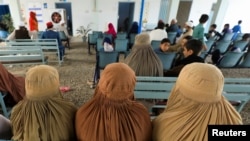The residency cards of more than a million Afghan refugees living in Pakistan have not been extended, causing concern among the migrants about their refugee status.
The Proof of Registration cards of about 1.3 million registered Afghan refugees expired June 30, 2023, and the Pakistani government has yet to extend them.
Afghan refugees in Pakistan told VOA that they are facing many obstacles, including restrictions on movement within Pakistan and the curtailment of employment.
“We are facing problems,” said Ali Zadran, an Afghan refugee in the Kot Chandna refugee camp in Mianwali in Pakistan’s Punjab province.
"Our cards have expired. ... We can’t travel. We can’t even reserve a hotel room,” he said, adding that Pakistani security forces harass refugees without proper documentation.
Ahmad Shah, an Afghan refugee in the Kohat district of Khyber Pakhtunkhwa province, told VOA that failure to extend the cards means refugees would be vulnerable to police abuse.
“When we go out, police are everywhere. When they stop us and see our cards that are expired, then we are arrested.”
He said the cards are only used as proof that “we can stay in Pakistan, but the renewal takes longer.”
The cards serve as an identity document by which Afghan refugees can remain legally in Pakistan and travel within the country. It cannot be used to travel outside the country.
The registered refugees who have valid cards “cannot be arrested under the 1946 Foreigners Act or other preventive laws.”
The Proof of Registration cards were issued to Afghan refugees in Pakistan in 2006 and were last extended for two years in 2021.
The United Nations High Commissioner for Refugees stated that among 3.7 million Afghans living in Pakistan, more than 1.3 million are registered.
UNHCR spokesperson in Pakistan, Qaiser Khan Afridi, told VOA that the U.N. is in touch with Pakistani officials.
“The Interior Ministry [of Pakistan] has sent an official letter to the provincial governments in Pakistan that they [Pakistani police] should not take any steps against the Afghan refugees until their PoR cards are not renewed,” he said.
Abbas Khan, Pakistan’s commissioner for Afghan refugees, told VOA that the cards may be extended.
“The cards might be extended for two years. Otherwise, the relevant organization would send a letter so that there would be no problem for the Afghans,” he said.
But some Afghans are concerned about losing their jobs.
Milad Wahidi, an Afghan refugee who lives in Peshawar and works with a foreign organization in Islamabad, told VOA that he must stay at home until his card is renewed.
“I will lose my job if the card is not renewed soon,” he said. “I have children, and it will be difficult for me to feed them without having a job.”
New refugees
Meanwhile, thousands of Afghans are fleeing the Taliban and crossing the border to neighboring countries. In Pakistan, crackdowns on Afghan refugees have intensified in recent months despite Taliban calls for Pakistani authorities to stop arresting Afghans living in Pakistan.
Human rights watchdogs also have called on Pakistan to stop the harassment of Afghan refugees.
“The Government of Pakistan must urgently stop arbitrarily arresting and harassing Afghan refugees and asylum-seekers, many of whom are fleeing persecution by the Taliban,” Amnesty International said in a statement on June 20.
UNHCR adds that after Kabul fell to the Taliban in August 2021, around 1.6 million people fled Afghanistan, of which 600,000 crossed the border into Pakistan.
Roshan Noorzai from VOA's Afghan Service contributed to this report, which originated in VOA's Afghan Service.




